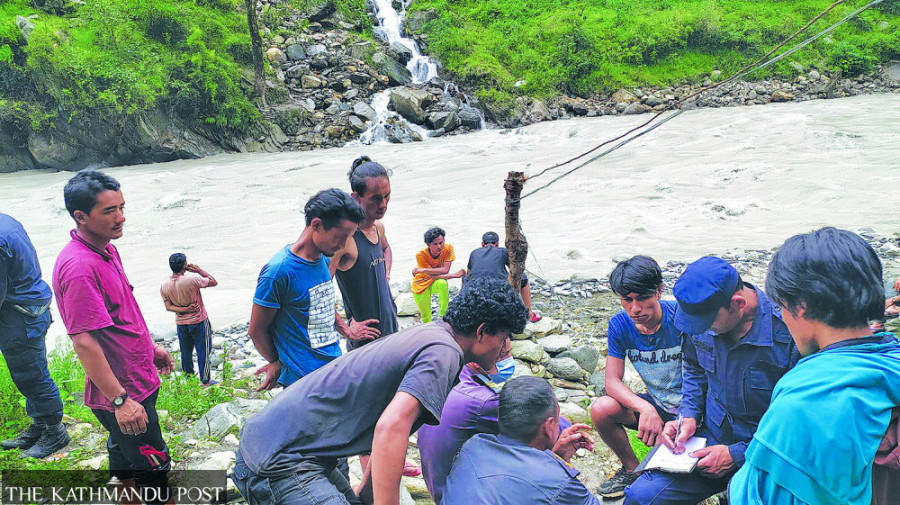National
Probe hints at Indian security personnel’s involvement in Darchula youth disappearance
Report recommends government take initiatives at diplomatic level as the incident took place ‘in the presence’ of India’s Sashastra Seema Bal.
Tika R Pradhan & Shuvam Dhungana
The panel formed to investigate last month’s incident in which a Darchula youth fell into Mahakali while crossing the river using a cable crossing has said “it appears the incident took place in the presence of Indian security personnel” and recommended that the government take diplomatic initiatives to bring the perpetrator(s) to book.
The probe panel, formed on August 1, a day after the incident, submitted its report to Home Minister Bal Krishna Khand on Tuesday.
“The report was submitted to the home minister today,” said Phanindra Mani Pokharel, spokesperson for the Home Ministry. “Now it’s up to the government to implement it.”
The five-member panel was headed by Janardan Gautam, a joint-secretary at the Home Ministry.
On July 30, Jaya Singh Dhami, 33, from Khangdang Mal of Byas Rural Municipality-2 in Darchula fell into Mahakali while crossing the river using an improvised cable crossing, locally known as tuin. Media reports based on eyewitness accounts suggested that a Sashastra Seema Bal (SSB) person had untangled the cable just when Dhami was about to reach the Indian side, across the river.
After falling into the river, Dhami was swept away by the raging waters and his whereabouts remains unknown.
The Gautam-led probe panel was initially given 10 days to submit its report. However, its term was extended three times.
The Sher Bahadur Deuba government was facing criticism for failing to make the report public and taking a position on Dhami’s disappearance.
Instead of making the report public, the government on August 26 announced Rs1 million in compensation for Dhami’s family, attracting more criticism, as many considered it as an attempt to quell growing demands that Deuba take a firm stand on the incident.
There were also concerns if the Deuba government was reluctant to make the report public so as not to antagonise India.
The probe panel submitted the report, exactly a month after the incident, but the government has not made the details public yet.
The panel, according to a statement issued by the Home Ministry, has recommended that the government make arrangements for the livelihood of Dhami’s family and education of the children.
The Gautam-led probe panel had Deputy Inspector General of Nepal Police DIG Purushottam Kandel, Hutaraj Thapa, an investigation officer from the National Investigation Department, Suresh Shrestha, a senior superintendent from the Armed Police Force, Jyotsana Bhatta Joshi, assistant chief district officer of Darchula, as members.
Nabin Singh Dhami, an eyewitness, had told the Post on August 1 that Jaya had almost made it to the other side when he suddenly fell, along with the cable after it was detached from a tree on the Indian side, into the river.
Anand Swarup, then district magistrate of Pithoragarh, had written to his Nepali counterpart Siddha Raj Joshi, chief district officer of Darchula, on August 1, claiming that the Sashastra Seema Bal was not involved in the incident.
Nepal's failure to make its position on the incident had created quite an uproar, with some accusing the Deuba government of making attempts not to antagonise India.
Gautam, who led the probe panel, told the Post last week that there were multiple factors leading to the delay in completing their investigation report on time.
He said that at least two members were faced with some pressing family matters and that they were not available to finalise the report.
“As you know, this issue is quite sensitive,” said Gautam. “The area is also remote so it took time to complete the investigation.”
Gautam was right in saying that the “area is remote”—so remote it is that the Nepali state too has not been able to pay attention to the region.
Darchula, however, is a region which Nepal’s political parties have used for their partisan interests and they consider it a strategic issue.
Kalapani, Limpiyadhura and Lipulekh, which Nepal included in its new map published in May last year, fall in Darchula. The region is claimed by India as its own.
The Nepali state’s presence in the region, however, is nil.
The absence of the state has made Darchula people depend entirely on India—not only when they have to travel to their own district headquarters or to Kathmandu but also when they have to buy daily essentials.
On July 30, Jaya Singh Dhami was on his way to Kathmandu, the Capital, where he was supposed to complete some tasks before flying abroad as a migrant worker. But in the lack of a road connecting his village and the district headquarters, he was left with no option than to take the risky means of crossing the raging Mahakali river.
People of Darchula have for long said that unless the state pays attention to their plight and the conditions they live in, lip service by political parties in Kathmandu and their pronouncement of reclaiming territory mean little, as more residents could meet Jaya Singh’s fate.
Amid the delay in making the report public, Deuba had come under pressure from his coalition partners as well.
On Monday, leaders of the ruling coalition, including Baburam Bhattarai, Narayan Kaji Shrestha, Dev Prasad Gurung and Beduram Bhusal, expressed their dissatisfaction at the delay in making the report public. They called on the prime minister to make the government’s position clear at the earliest.
It was not immediately clear when the detailed report would be made public.
Home Minister Khand refused to speak on the matter.




 16.12°C Kathmandu
16.12°C Kathmandu















